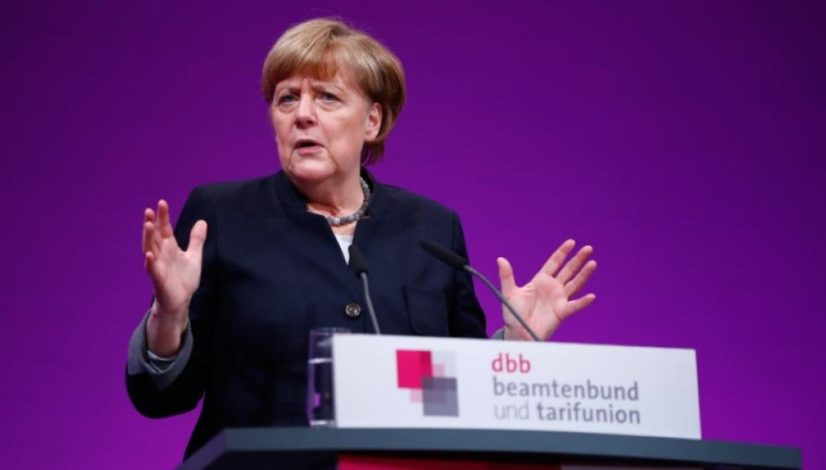Merkel Deports More Refugees While Blasting Trump’s Refugee Ban
Donald Trump is not the only head of state trying to protect against the possibility that refugees may also be terrorists. He’s just the most open about it.
In an outburst of brazen hypocrisy, German Chancellor Angela Merkel blasted President Trump’s temporary travel ban, saying it is “not justified to put people from a specific background or faith under general suspicion” to combat terrorism. Meanwhile, Merkel is doing back flips to rid her country of hundreds of thousands of asylum seekers from mostly Muslim countries who have flocked in through her open doors.
Just days after lashing out at Trump over his executive order, Merkel announced efforts to expedite expulsions of refugees who have failed to win asylum in Germany. In 2016, more than 150,000 people seeking sanctuary in Germany were rejected; only about 25,000 were expelled. Today, there are more than 200,000 people living in Germany who should be deported. Chancellor Merkel would like those people gone.
Why the sudden urgency? Put it down to the terror attack in December when a Tunisian refugee drove a truck into a crowded Christmas market, killing 12 people and injuring nearly 50 others. The attacker, Anis Amri, had sought asylum and had been turned down; apparently, Tunisia was unwilling to take him back.
It wasn’t the first such incident. In July last year, a Syrian who had been denied asylum and who had declared allegiance to ISIS set off a bomb outside a wine bar in Ansbach, killing himself and injuring more than a dozen.
As Merkel’s political standing has been hit by growing concerns that her admission of one million refugees has created a security nightmare, she has gotten tough on deportations and on Muslim assimilation. In a recent speech in Cologne, she said, “Anyone who does not have a right of residence must be returned to their home country.”
She particularly targeted Algeria, Morocco, and Tunisia (majority Muslim countries), classifying them as “safe countries of origin” in order that their applications can be processed quickly, and those rejected can be returned home asap. To coax those governments into cooperating, Merkel’s government hinted that development aid could be withheld.
Not only does Merkel want to toss out those without legal status, but she also insists that those who do achieve legal residency must “integrate” properly.
Merkel, whom the Financial Times says “leads Europe’s fight for liberal values,” also supported outlawing the Muslim veil, calling it “inappropriate.” Those comments came in late December after the arrests of two asylum seekers in connection with three sexual assaults, including the rape and murder of a medical student. Her Vice Chancellor doubled down, saying, “Salafist mosques must be banned, the communities dissolved and the preachers should be expelled, as soon as possible.” Yet Merkel criticizes Trump.
While Germany wants to send refugees home, Australia and Kenya want to send them to the U.S.
Australia refuses to allow asylum seekers who arrive by boat to settle in the country. Instead, because of a law passed in 2013, the nation stockpiles refugees in Australia-run immigration detention camps in the poor Pacific island nations of Nauru and Papua New Guinea. Two refugees desperate to get to Australia recently set themselves on fire at the camp in Nauru.
It was some 1,300 of those mostly Muslim asylum-seekers that President Obama agreed to allow into the U.S. In addition, there were 370 who had been allowed into Australia temporarily for medical treatment. It appears that coincident with that offer (hatched at Obama’s Summit on Refugees last September) Australia’s Prime Minister Malcolm Turnbull agreed to take part in the U.S.-led program to resettle Central American refugees from a camp in Costa Rica – mostly people who had been trying to cross into the United States.
So in a politically expedient arrangement, the U.S. agreed to take refugees that Australia does not want from the Middle East, Africa and Asia and Turnbull bails out Obama by accepting Central Americans desperate to enter the U.S. who are holed up in Costa Rica. No wonder that in his first conversation with the Australian leader, President Trump described the deal as “dumb” even as his executive order carved out an exception so that the agreement would be honored.
Dealing with refugees and the threat they pose is not just a problem for the developed world. Kenya’s government is trying to shut down the world’s largest refugee camp, home to hundreds of thousands of Somalis who have fled their violent country. The courts in Kenya halted the closure, saying it was an act of “group persecution, illegal, discriminatory, and therefore unconstitutional.”
The government claimed the camp had been linked to terror attacks carried out by Somalis, like the one at Westgate Mall, where 67 people were killed in September 2013. Rebutting human rights activists’ claims that refugees were not responsible, a spokesperson for the government said, “I will tell you for a fact, the people who carried out the terror attacks at Westgate, several of them were traced either through phone calls or through various contacts — intelligence — to refugee camps in Dadaab.”
Some 200 of those Somali refugees in Kenya were recently en route to the United States but then were blocked by President Trump’s executive order calling for more robust vetting for asylum-seekers. Because of the court’s intervention, those Somalis are now again heading for the United States.
As the refugees from Australia and from Kenya start to arrive in the United States, our country will be torn between our humanitarian instincts and the realization that other countries have suffered heavy penalties for opening their doors. It’s easy to see why a majority of our generous country thinks Trump’s desire for “extreme vetting” makes sense.
Published here.




